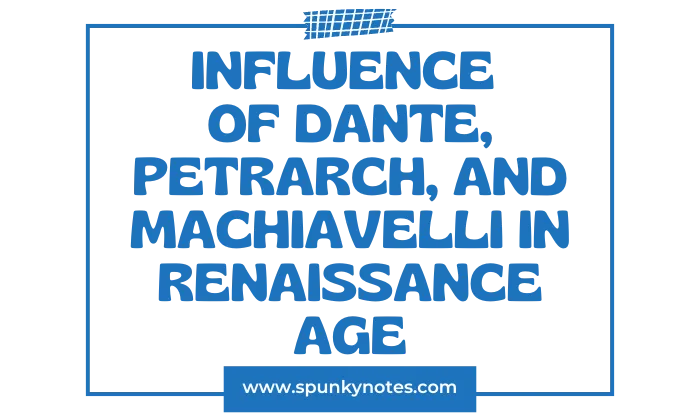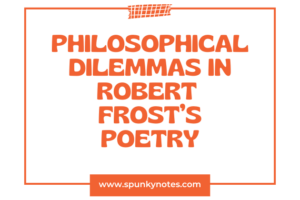

Estimated Reading Time: 6 min
Q. How did the works of Renaissance authors like Dante, Petrarch, and Machiavelli shape the intellectual and cultural changes of their time?
During the Renaissance, literature changed people’s thoughts about life, humanity, and society. Authors like Dante Alighieri (1265–1321), Francesco Petrarch (1304–1374), and Niccolò Machiavelli (1469–1527) made significant contributions to this period.
They wrote about human emotions, experiences, and the realities of life. Their writings differed from the religious-focused literature of the Middle Ages and helped shape Renaissance ideas.
Dante Alighieri (1265–1321)
Dante Alighieri was born in Florence, Italy in 1265. He is best known for his work The Divine Comedy, which is considered one of the greatest works of world literature. The poem describes a journey through Hell, Purgatory, and Heaven.
Dante’s work became important because he used Italian, the language ordinary people speak. At that time, scholars and the Church wrote in Latin. By writing in Italian, Dante made literature more accessible to many people.
In the poem, Dante explores ideas about morality and the soul’s journey. He shows how personal responsibility and choices affect where a person ends up in the afterlife. In Inferno, the first part of The Divine Comedy, people receive punishment according to their sins.
While moral justice was common in the Middle Ages, Dante focused on the individual’s experience. This emphasis on personal choices was a key element of Renaissance humanism, highlighting human actions and decisions.
For example, Dante’s portrayal of Ulysses in Inferno illustrates this focus on personal responsibility. In his version, Ulysses receives punishment for his excessive desire for knowledge.
This shows how even a hero must face consequences for his actions. Dante’s focus on personal responsibility marked a change from medieval literature, which often focused more on divine will than human decisions.
Francesco Petrarch (1304–1374)
Francesco Petrarch was born in Arezzo, Italy, in 1304.Francesco Petrarch is often called the “Father of Humanism.” He wrote poetry, especially sonnets, focusing on personal feelings and emotions.
One of his famous works is the Canzoniere, a collection of love poems about a woman named Laura. These poems shifted away from religious themes and focused on personal emotions like love and longing.
Petrarch’s writings marked a shift from religious devotion to celebrating human experiences. For instance, in his sonnets, he expresses deep love for Laura, the pain of not being with her, and the joy she brings him.
These personal emotions were new in literature, as previous works focused more on religious or societal concerns. Petrarch’s focus on human emotions helped to lay the groundwork for Renaissance humanism.
Petrarch also admired ancient Roman and Greek authors. He believed that studying their works could help people improve themselves. For example, Petrarch admired the Roman philosopher Cicero for his writing style and ideas.
This admiration for classical learning helped inspire the Renaissance interest in ancient texts. His work played a key role in shaping Renaissance education and thinking.
Niccolò Machiavelli (1469–1527)
Niccolò Machiavelli was a political theorist, diplomat, and writer born in Florence, Italy. He was a political writer whose ideas greatly impacted Renaissance political thought. His most famous work, The Prince, was written in 1513.
This book is a guide for rulers on how to maintain power. Machiavelli argues that a ruler should do whatever is necessary to stay in control. This could mean using cruelty or deception if needed.
Machiavelli famously says in The Prince that it is “better to be feared than loved” if a ruler cannot be both. This advice went against traditional views of rulers being moral and kind.
Instead, Machiavelli suggests that maintaining power is more important than following moral ideals. This practical approach to politics marked a clear shift from the religiously guided politics of the Middle Ages.
Machiavelli’s ideas stood in contrast to the Church’s teachings. The Church encouraged rulers to follow Christian values, but Machiavelli focused on practical results.
For example, Machiavelli advises rulers to eliminate enemies to avoid future threats. This realistic but ruthless approach to politics reflected the instability of Renaissance Italy, where city-states often fought for power.
Changes in Renaissance Literature
The works of Dante, Petrarch, and Machiavelli brought new ideas to literature. Dante showed that literature could be written in the common language and still address important moral and personal questions.
Petrarch’s focus on individual emotions and his admiration for ancient texts encouraged other writers to explore human experiences and classical works.
Machiavelli’s realistic view of politics challenged older ideas of how rulers should behave. His work had a lasting influence on political thought.
These writers moved literature away from the strict religious focus of the Middle Ages. They focused more on individual human experiences, personal emotions, and real-life issues.
For example, Machiavelli’s The Prince did not advise rulers to follow religious principles. Instead, it focused on how they could maintain power in a challenging world. This new focus on real-life situations and human behaviour became a key element of Renaissance literature.
Lasting Impact
The works of Dante, Petrarch, and Machiavelli left a lasting impact on literature and thought. Dante’s use of Italian helped make it a respected literary language. Many writers followed his example by writing in their languages instead of Latin.
Petrarch’s focus on humanism inspired writers to explore personal emotions and human experiences. Machiavelli’s ideas about power and politics still influence political science today.
Modern political leaders often refer to Machiavelli’s ideas when discussing power, manipulation, and leadership. His concept of “realpolitik,” or focusing on practical concerns over ideals, has influenced how leaders think about ruling.
In literature, writers who focus on personal emotions, such as William Wordsworth, or who explore human nature, like Leo Tolstoy, can trace some inspiration to Petrarch’s humanist ideas.
Conclusion
The works of Dante, Petrarch, and Machiavelli played a major role in the Renaissance. Dante made literature more accessible by writing in Italian and focusing on personal responsibility. Petrarch emphasized human emotions and the importance of studying classical texts.
Machiavelli introduced a practical approach to politics that prioritized maintaining power. These authors shaped Renaissance literature and impacted how we think about human nature, leadership, and personal experience.


